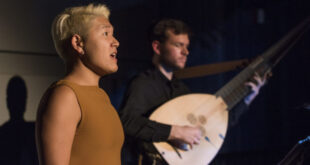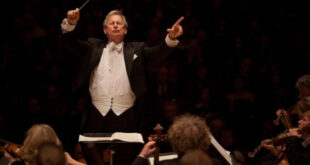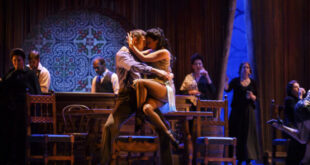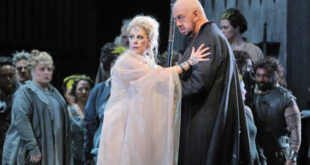 Johan Botta as Otello (Photo by Ken Howard courtesy of the Metropolitan Opera)
Johan Botta as Otello (Photo by Ken Howard courtesy of the Metropolitan Opera)
Shakespeare’s “Othello” is one of the greatest plays of all time. In the characterizations of Desdemona and Iago, the concepts of Pure Good and Pure Evil are contrasted, as is not to be found anywhere else. As for Othello, the play shows how the most powerful of men can be utterly destroyed by jealousy. The theme of a black man and white woman loving each other is to this day controversial, and is a fascinating subject that has remained appealing to audiences ever since the tragedy was first performed in the very early 1600s.
It was the most natural thing in the world for Italians to adapt the subject for opera, as Shakespeare based his masterpiece on a short story by the Italian author Cinthio, as he did with “Romeo and Juliet,” “The Merchant of Venice” and others. Up until 1887, the definitive Italian opera version was “Otello” (1816) by Rossini. But once Verdi’s “Otello” entered the repertoire, Rossini’s work was almost totally forgotten. And why not? Giuseppe Verdi was by far the dominant composer (after the passing of Beethoven) in a century jam packed with brilliant composers! And the poet who composed the libretto was perhaps the most renowned figure in Italian literary art, Arrigo Boito.
It is argued by many that “Otello” is Verdi’s greatest opera. Musically, there is no doubt that it boasts the composer’s most dynamic, complex and harmonically advanced score. Boito’s libretto follows Shakespeare very closely, making for a gripping, compelling drama. Thus the profound artistic magnitude of the opera can be said to be the product of a true collaboration (including the contribution of the premiere’s conductor Franco Faccio). Twenty-some years before the premiere of “Otello,” however, this collaboration would seem unthinkable. And it probably would never have happened without the efforts of Giulio Ricordi, one of the sharpest businessmen and keenest judges of talent that ever lived!
After independence and unification in 1861, Italian art and music seemed to sink into a malaise of sorts. What made things worse was that virtually all of the younger malcontented people who did practice one form of art or the other belonged to a group known as the “scapigliati” (lit. “the disheveled”), not unlike our “hippies” of the ’60s and ’70s. Despite coming from a conservative and very powerful business family, Giulio Ricordi was a “scapigliato,” along with Arrigo Boito and Franco Faccio. With offices on the main floor of La Scala, Ricordi was the leading music publishing company in Italy. As it had been with the previous masters of Italian opera, Ricordi was Verdi’s publisher (and would be Puccini’s, also).
Doing the equivalent of “tune in, turn on and drop out,” the young Giulio Ricordi was a great admirer of Boito and Faccio, but he was levelheaded enough to realize that Verdi was still Italy’s supreme artist. As he assumed more responsibility with his family’s company he saw — correctly, as early as the 1860s — that an opera with Verdi’s music and Boito’s poetry would be a sure-fire winner. Unfortunately Boito (surely not purposely) made such a collaboration virtually impossible.

Ana Maria Martinez as Desdemona (Photo by Eric Mahoudeau courtesy of Artcomart)
Before he became a fine conductor, Faccio composed two operas, both now forgotten. But after the premiere of his first, “I profughi fiamminghi” (The Flemish Refugees) in 1863, the La Scala reception was positive. Accordingly there was a celebratory dinner that night and Boito (probably after drinking too much wine) proposed a toast to Faccio in the form of an improvised ode, which contained the passage: “Perhaps the man is born … who can restore art to its altar, now stained like the walls of a brothel.” This was published and Verdi read it. So he had befouled the altar of art? Who else could Boito have meant? No matter how hard he tried, Boito could not escape Verdi’s wrath, and for 12 years, the composer occasionally referred to this ugly poem.
Ricordi, however, never gave up on uniting the considerable talents of Verdi and Boito. First he tried to get the composer to set Boito’s “Nerone” to music, but Verdi chose to write “Aida” instead, followed by the Requiem. Finally, in 1879, after plotting with Verdi’s wife Giuseppina, Ricordi convinced Verdi to take a look at Boito’s libretto of “Otello,” But before he actually agreed to the project Verdi employed Boito to help revise “Simon Boccanegra,” and the new version was successfully staged at La Scala in 1881. Over the course of the next six years, Verdi and Boito, in regular contact with each other, fashioned the mighty Otello, which is being performed this season by Chicago’s Lyric Opera.
The remaining performance dates are: October 21, 25, 29 and November 2. For more information visit www.lyricopera.org or call 312-332-2244.
 Fra Noi Embrace Your Inner Italian
Fra Noi Embrace Your Inner Italian






